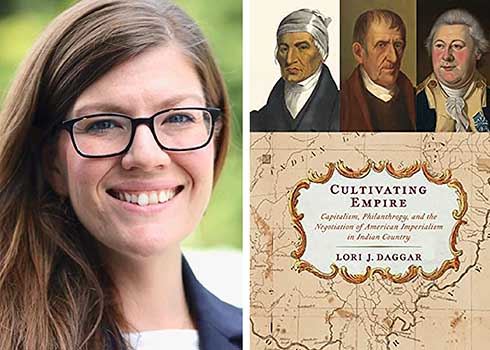Nazareth alumna publishes book with UPenn Press
by Jillian Setek
A new book with a fresh perspective on connections between American capitalism, missionary work, and Native American politics got its start when Lori J. Daggar ‘09, Ph.D., was a Nazareth history student — and the book was fueled by support from her Nazareth professors.
Cultivating Empire: Capitalism, Philanthropy, and the Negotiation of American Imperialism in Indian Country serves as a guide to understand the making of the American empire in the late-18th and early-19th centuries. Daggar, an associate professor of history at Ursinus College in Collegeville, Pa., credits her history professors for helping her start the research and writing project over a decade ago.
Daggar initially began her time at Nazareth studying music education, but with support and guidance from her professors, eventually switched her major to history. As a freshman, Daggar enrolled in a 400-level history course, American Colonies. Although the course is geared toward juniors and seniors, she excelled in the course and was inspired to follow her passion for history. By invitation, as a first-year student, she presented a research paper at the local Phi Alpha Theta Conference for undergraduates.
Native American history courses prompted her to research Native politics, which she continued in an independent study course. “I always enjoyed history and wanted to learn more about the bigger pictures of stories,” said Daggar.
Under the guidance of Nazareth Professor Tom Lappas, Ph.D., Daggar became interested in learning how people of different cultures interact with one another, and similarities and differences between cultures. She initially set to focus Cultivating Empire on similarities and differences of religion, but through her research, shifted her focus to economics.
Daggar emphasized how the support and guidance of her professors at Nazareth were instrumental in the development of Cultivating Empire. She praised the practical, intellectual advice she received from Lappas throughout her time at Nazareth.
“While you never know what students like Lori are going to do with their history degrees, it was clear that diving into the research, spending time in the archives, and developing fresh interpretations brought a smile to her face,” said Lappas. “While the study of history often forces the historian to face the ugliness of humanity, there is a joy in trying to solve — or at least interpret — the mysteries of the past, and Lori had that from the very start. It is so wonderful to see this project come to fruition.”
With funding from the History, Politics, and Law Department at Nazareth, Daggar was able to spend time during her junior year’s spring break researching in the archives at the Historical Society of Pennsylvania and at Haverford College. This trip was essential in preparing Daggar for not only her graduate studies, but her journey as both a writer and a professor as well.
Daggar hopes that readers of Cultivating Empire will learn more about historical events that may be unfamiliar to them. Topics include how the U.S. empire and economy is built on Native people’s land, homes, investments, and futures; and how sovereign Native nations are still negotiating American colonialism.
“All historians want to write a history that adds something new,” said Daggar. “I always want to be able to tell new stories with new or unfamiliar characters.”
After graduating fromNazareth, she earned both her master's degree and doctorate from the University of Pennsylvania.
Daggar teaches a wide variety of courses at Ursinus, including Native North America, Defining America, Native American Activism, and Digital Humanities. She is in the early stages of writing a new book, focusing on native people’s ideas during the age of revolutions.
Contact
Julie Long | Senior News & PR Officer | jlong2@naz.edu | (585) 389-2456 | (585) 781-8186 (cell)
Nazareth University is an inclusive community of inspired learners, educators, and changemakers who for 100 years have been driven by a bold commitment to action, empathy, equity, and leading innovation for the common good. Impact experiences are at the heart of a Nazareth education, preparing each student to discover within themselves the potential to cultivate positive change in their life's work, in any career field, and in a world that is constantly evolving and infinitely interconnected.
Our broad academic offerings present a range of study options typical of larger universities, yet achieved in our supportive campus culture. Nearly 2,100 undergrad and 600 graduate students enroll in degree and certificate programs and engage in collaborative, transformative learning experiences, preparing for the professions and society of today and tomorrow. In a learning community that purposefully integrates liberal arts and professional programs, Nazareth University graduates are able to launch a lifetime of impactful leadership in communities and workplaces near and far.
